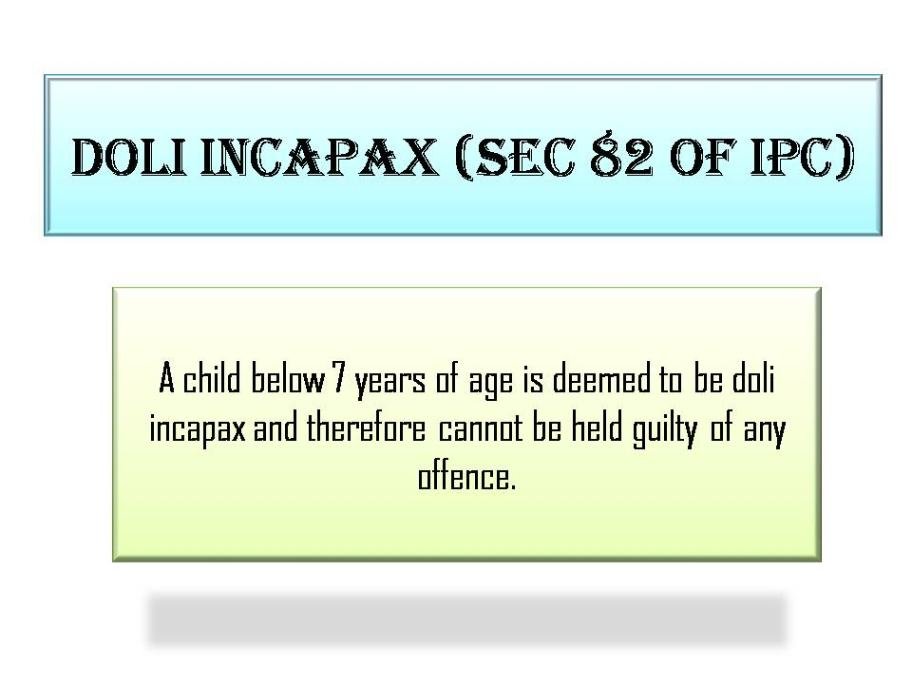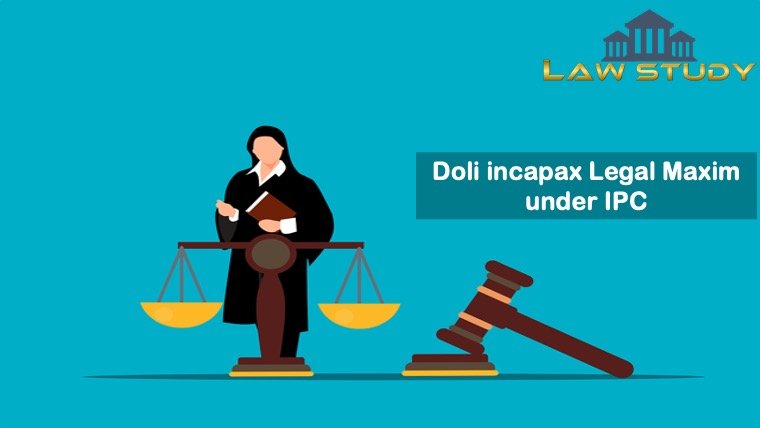‘Doli incapax’ is a Latin legal maxim that roughly translates to ‘incapability to commit a crime.’ This term was introduced in Sec 82 of IPC, 1860, as well as the Juvenile Justice Act, 2015.
In terms of the law, both boys and girls below the age of 7 are considered infants and cannot be charged with a crime due to a lack of ability to understand what constitutes a crime. In other words, they are unable to differentiate between right and wrong due to a natural incapacity and are therefore immune from legal punishment under English & Roman law.
Origin of the Doli incapax
Doli Incapax is a Latin phrase that denotes “incapable of causing harm.” In most regions of the world, this phrase refers to the criminal law presumption of innocence for infants.

Explanation of the Doli incapax
The theory of criminal liability encompasses the presumption in Doli incapax. The theory is based on the idea that an individual must only be held criminally liable for acts that he intends to commit. As per English law, a child under the age of 10 is recognized as doli incapax. A child under the age of 14 is recognized as doli incapax in Germany & Italy, and a child under the age of 9 is recognized as doli incapax in the Philippines.
In India, the criminal statute recognizes an age limit under which children are not actually capable of committing a crime. The Indian Criminal Procedure considers children under the age of seven to be incapable of having the necessary cognitive and moral processes to commit an offence. This is total immunity. The CrPC actually provides for a presumption of innocence in the pursuit of children aged 7 to 12, but the infant can be arrested and tried if the prosecution can prove it as well as provide evidence to the contrary.
From the age of 14 – 18, a child is only subject to liability if he understands both the legality and the punishability of the act. A child can be tried as an adult only if a general test is conducted to ascertain whether the infant had adequate knowledge of the causes & effects of his actions.
IPC, 1860 Contains Legal Provisions
Sec. 82: Absolute immunity
Section 82 of the IPC, 1860, Ch- IV, relating to ‘General Exceptions,’ states that “nothing done by a child below 7 yrs of age is an offence.” As a result, no infant below the age of 7 can be prosecuted. Because a child of this age is incapable of differentiating between wrong & right, the law grants such a child absolute immunity from criminal prosecution, trial, & conviction.
Blackstone explained that infancy is a deficiency of knowledge and understanding, so young children under the age of discretion must not be penalized. The age of discretion, however, differs from country to country. The protection given to infants and young children under U/S 82 is broad, and it covers not only crimes under the IPC but also crimes under local as well as special laws.
Sec 83 Partial or qualified immunity from prosecution
A child who is above the age of 7 but under the age of twelve is partially immune from prosecution u/s 83 of the I.P.C. Nothing done by a child above the age of 7 but under the age of 12 who has not attained a maturity level of understanding to decide the cause and effects of his acts on that occasion is an offence, according to the law.
Section 83 Ingredients
- The act is committed by the infant.
- The infant is between the ages of 7 & 12.
- The child lacks the understanding and maturity to decide the nature as well as consequences of his actions on that occasion.
This means that an infant aged 7 to 12 will be exonerated of criminal liability only if it can be proved that, at the time of the offence, the infant lacked the maturity of understanding to decide the nature as well as repercussions of his actions. To find out whether the child has attained sufficient maturity of understanding, the nature of the act, the conduct of the child before and after the act, his behavior, and conduct in court are relevant considerations.
Landmark Judgments
Heeralal v. State of Bihar case.
A minor child, armed with a sharp knife, threatened to cut someone into pieces. Following that, the accused infant attacked the person with a knife & stabbed him to death. Sec 83 of the IPC was invoked by the accused child as a defense.
The trial court, on the other hand, found the alleged infant guilty, stating that he had reached the age of maturity to recognize the repercussions of his action because he was carrying a knife, trying to threaten to kill someone, and then killing someone. The case even went all the way to S.C., but it was dismissed.
In Kakoo v. State of H.P case,
A 13-year-old boy was found guilty of raping a 2 yr old girl and was sentenced to prison. To reduce the sentence of the harsh punishment, the accused’s prosecutor urged the Court to consider Sec 83 & 84 of the IPC, which states that adults & children should not be treated in the same way when hearing a criminal trial.
Despite the fact that the child was found guilty of rape, the Court reduced the punishment by accepting the lawyer’s argument.
As a result of the judgment, it can be asserted that Sec 82 & 83 do not provide enough for ‘doli incapax,’ but it also serves as a signal to the justice system while dealing with cases that infants are not to be handled as equals to adult in criminal matters. When it comes to children, it is now a well-established legal doctrine that the court system must consider taking a humanitarian approach and make sure that the infant is reformed rather than turned into a hardened criminal.
Heeralal Mallick v. State of Bihar
S.C. cited R. v. Kershaw to rule that actus reus cannot be used as proof of men’s rea. It must be proven that the child was aware that he was engaging in morally reprehensible behavior, which would establish the accused child’s intent or men’s rea.
Conclusion
‘Doli incapax’ is a Latin legal maxim that roughly translates to ‘incapability to commit a crime. Sections 82 & 83 of the Indian Penal Code, 1860, discuss the implementation of this legal maxim. Sec 82 of the I.P.C exempts infants under the age of 7 years from all criminal culpability in India.
U/S 83 of the I.P.C exempts infants aged 7 to 12 years from criminal culpability if it can be proven that the suspect infant lacked the mental capacity and basic understanding to understand the consequences of his actions.
The presumption of innocence does not favor the accused child, and the defense must prove that the alleged infant lacked the mental capacity to commit the crime. Children are exempt from such criminal culpability because they do not have sufficiently matured mental abilities to differentiate between right & wrong.

























